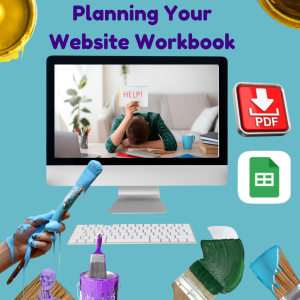Confused about which website builder to use? As a small business owner in the digital age, having a professional and appealing online presence is key to your overall success. A very common question we get from new business owners or even those just deciding they need a website for the first time is “Which web builder should I use?”

Your website is your digital storefront, open to customers 24/7, and it should reflect the uniqueness of your product, service, or expertise. Luckily, creating and managing a website doesn’t require you to be a tech guru these days, all thanks to accessible user-friendly website builders. Many webhosts (see this blog post about how to choose an webhost) also have webbuilders built into their hosting platform. However with so many website builders available in the market, and also AI builders how do you choose the right one for your business? Here’s a step-by-step guide to help you out.
How to choose a Website Builder.

Step 1: Identify Your Needs.
Before diving into the world of website builders, take a moment to identify what you need from your website.
Are you an e-commerce retailer? (a business that is selling from their website such as clothing store, furniture shop, digital product seller etc).
A physical business trying to establish an online presence?
A content provider like a blogger or a news site?
Every website builder has its strengths and weaknesses, and some are geared for specific types of sites. Make a list of features you want on your website like a blog, online store, reservation system, or photo gallery, to name a few.

Step 2: Set Your Budget.
While several website builders offer free versions, these often come with limitations that may not best represent your business. Determine how much you’re willing to invest in setting up and maintaining your website. Keep in mind, this is an investment in your business’s future.
Step 3: Look at Ease of Use.
As a small business owner, you probably don’t have tons of extra time to spend learning a complex new tool. Look for a website builder that’s intuitive and user-friendly. Most website builders offer a free trial – take advantage of this. Realise that all web builders have a learning curve so factor in your skills and the amount of time you have to learn.
Step 4: Evaluate Design Flexibility.
A good website builder should offer excellent design flexibility, including a wide range of templates and the ability to customize these to match your brand. Evaluate the quality of the design templates and how easy it is to change the layout, add new pages, or update content.
Step 5: Check out SEO and Mobile Compatibility.
Turbo-charge your website’s visibility on search engines choosing a website builder that includes SEO tools. Also, ensure the website builder offers mobile-responsive templates. With high levels of mobile internet usage, having a mobile-friendly website is non-negotiable.
Step 6: Analyse E-commerce Capabilities.
If your business sells products or services online, you’ll need a website builder with robust e-commerce capabilities. This includes secure payment processing, inventory management, and sales reporting.

Step 7: Consider Scalability.
Your business will grow and so should your website. Make sure the platform you choose can handle this growth without needing to rebuild your site from scratch.
Step 8: Look at Customer Support.
Even with the most intuitive platform, you may run into issues or questions. Choose a platform that provides robust customer service and support, be it through live chat, email or phone support.
Step 9: Read Reviews.
There’s no better way to gauge a website platform’s performance than hearing from others who’ve used it. Look for reviews online to get a feel of the general user experience and any potential drawbacks you should anticipate.

Step 10: Test Them Out.
Try out a few top contenders before settling on one. This hands-on experience will provide valuable insights into the ease of use, features, pricing, and support provided each.
Remember, the best website builder for your business should strike a balance between your budget, your needs, and your comfort level with the platform. Choosing the right website builder may seem daunting initially, but following these steps, you’ll be well on your way to finding the perfect fit for your small business.
If you want a great method to work out which website platform is right for you grab our workbook

If you have specific questions please get in touch.

Pingback: How to Choose a Web Host - rawmarrowblog
Comments are closed.